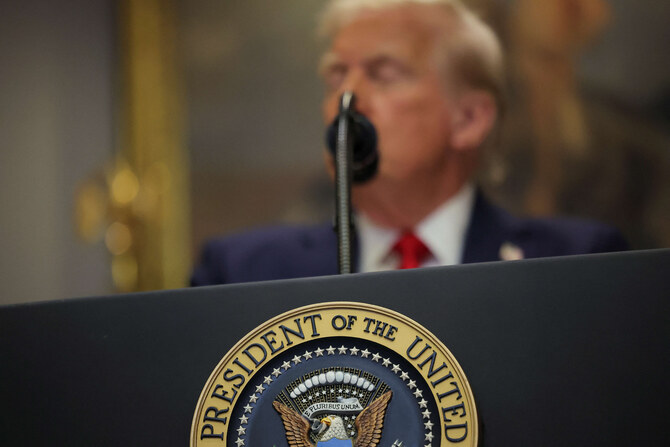SINGAPORE: Oil prices were little changed on Wednesday as markets weighed US President Donald Trump’s declaration of a national energy emergency on his first day in office and its impact on supply.
Brent crude futures rose 9 cents to $79.38 per barrel at 7:20 a.m. Saudi time, while US West Texas Intermediate crude futures inched up 1 cent to $75.84.
The contracts settled lower on Tuesday after Trump laid out a sweeping plan to maximize oil and gas production, including by declaring a national energy emergency to speed permitting, rolling back environmental protections, and withdrawing the US from the Paris climate pact.
“Market participants are trying to digest the mixed signals that Trump 2.0 bring for the trajectory for oil prices,” said Yeap Jun Rong, market strategist at IG.
“Near-term focus will be on whether his aim to fill up the US strategic reserves materializes,” said Yeap, adding that attention is on his upcoming tariff policies.
Trump’s latest energy policy is unlikely to spur near-term investment or change US production growth, analysts at Morgan Stanley wrote in a note, adding that it could, however, moderate potential erosion of refined product demand.
Analysts also questioned if Trump’s promise to refill the strategic reserve would make any changes to oil demand as the Biden administration was already purchasing oil for the emergency stockpile.
Investors also remained cautious as Trump’s trade policy remained unclear. He said he was thinking of imposing 25 percent tariffs on imports from Canada and Mexico from Feb. 1, rather than on his first day in office as previously promised.
The US president also added that his administration would “probably” stop buying oil from Venezuela, among the top suppliers of oil to the country.
Meanwhile, a rare winter storm churned across the US Gulf Coast on Tuesday, and much of the US remained in a dangerous deep freeze.
North Dakota’s oil production was estimated to be down by between 130,000 and 160,000 barrels per day due to extreme cold weather and related operational challenges, the state’s pipeline authority said on Tuesday.
The impact of the storm on oil and gas operations remained limited in Texas, with minimum interruptions in gas flows, few power outages and plenty of gasoline inventories at the pump, as many roads and highways remained closed.


























